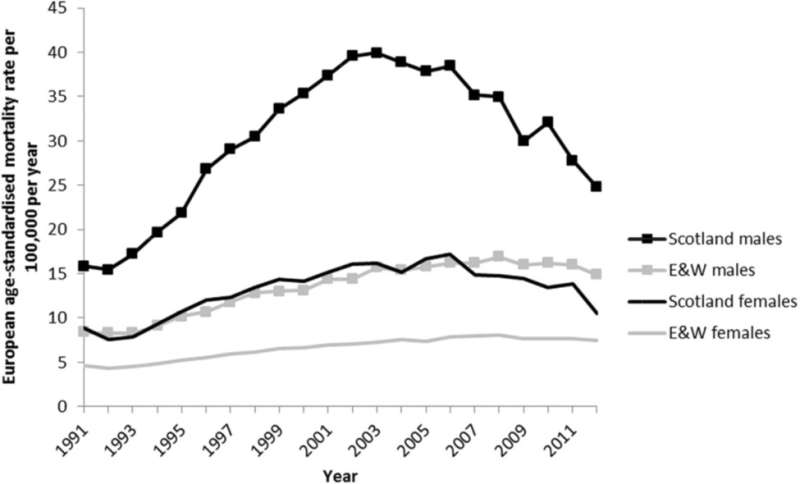Exploring the rise and fall of alcohol-related mortality in Scotland

New research has found that the rise in alcohol-related mortality during the 1990s and early 2000s in Scotland, and the subsequent decline, were likely to be explained in part by increasing then decreasing alcohol affordability. The research was undertaken to understand better what the independent impact of the Scottish Government's alcohol strategy was. Other factors aside from the strategy and the affordability of alcohol were also considered including migration, historical social, economic and political change, the alcohol market, social norms, and health services.
"Alcohol has been suggested to be the most harmful substance misused in societies when wider harms on health and social outcomes such as violence and reduced economic output, are taken into account," explained lead investigator Dr. Gerry McCartney of NHS Health Scotland, Glasgow, UK. "Our work evaluated the extent to which differing trends in income, demographic change, and the consequences of an earlier period of social, economic, and political change might explain differences in the magnitude and trends in alcohol-related mortality between 1991 and 2011 in Scotland compared to England & Wales.
We found that increasing alcohol affordability during the 1990s is likely to have been important in explaining the rise in alcohol-related harms. It also seems likely that a generation of people negatively affected by the rapidly changing economy during the 1980s was subsequently at particularly high risk. We hypothesized that this was linked to the rise in unemployment and the breaking down of the social fabric in many communities following on from the changed government approach."
The research team used a variety of methods including literature review, descriptive analysis of routine data, narrative synthesis, comparative time trend analyses, and arithmetic modelling.
"Given the likely importance of alcohol affordability in driving the downward trend in alcohol-related mortality, any future increase in incomes or decline in prices might be expected to increase alcohol-related harms in Scotland once again, commented Dr. McCartney. "The most recent trends in consumption, harms, and alcohol affordability provide an early indication of this. It is therefore important that a comprehensive range of alcohol control policies is in place to prevent this."
More information: G. McCartney et al. Explaining trends in alcohol-related harms in Scotland, 1991–2011 (I): the role of incomes, effects of socio-economic and political adversity and demographic change, Public Health (2016). DOI: 10.1016/j.puhe.2015.12.013















